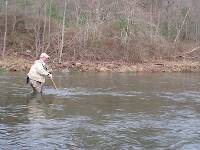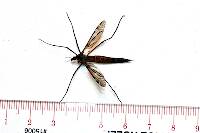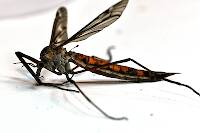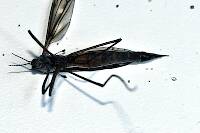
Blue-winged Olives
Baetis
Tiny Baetis mayflies are perhaps the most commonly encountered and imitated by anglers on all American trout streams due to their great abundance, widespread distribution, and trout-friendly emergence habits.
Featured on the forum

This one pretty clearly keys to Kogotus, but it also looks fairly different from specimens I caught in the same creek about a month later in the year. With only one species of the genus known in Washington, I'm not sure about the answer to this ID.

Troutnut is a project started in 2003 by salmonid ecologist Jason "Troutnut" Neuswanger to help anglers and
fly tyers unabashedly embrace the entomological side of the sport. Learn more about Troutnut or
support the project for an enhanced experience here.
Troutnut on Mar 22, 2007March 22nd, 2007, 11:45 am EDT
I just found this great essay: "Politics and the English Language"
This isn't related to fly fishing, but since many members study the English language as a second hobby or profession, it makes sense to share it here.
Even though Orwell wrote this in 1946, his points still apply. The language used in politics and by some academics continues to deteriorate. He reminds me of my "Freshman Writing Seminar" at Cornell, in which we studied some social theory and art criticism. The class was unintentionally an excellent lesson in what not to do, because most of the papers we read made me want to rip the author's thesaurus from his hands and use it to beat his keyboard into 26 little pieces. The authors abused lofty language to sound smarter than they were and give weight to empty ideas, and they borrowed constantly from science to one-up each other in syllable density.
Although academics often write better than the general population, they are more prone than others to the vices Orwell highlights. That's what makes this essay so interesting.
This isn't related to fly fishing, but since many members study the English language as a second hobby or profession, it makes sense to share it here.
Even though Orwell wrote this in 1946, his points still apply. The language used in politics and by some academics continues to deteriorate. He reminds me of my "Freshman Writing Seminar" at Cornell, in which we studied some social theory and art criticism. The class was unintentionally an excellent lesson in what not to do, because most of the papers we read made me want to rip the author's thesaurus from his hands and use it to beat his keyboard into 26 little pieces. The authors abused lofty language to sound smarter than they were and give weight to empty ideas, and they borrowed constantly from science to one-up each other in syllable density.
Although academics often write better than the general population, they are more prone than others to the vices Orwell highlights. That's what makes this essay so interesting.
Jason Neuswanger, Ph.D.
Troutnut and salmonid ecologist
Troutnut and salmonid ecologist
GONZO on Mar 22, 2007March 22nd, 2007, 3:54 pm EDT
Jason, I thought this was a really timely essay for both personal and political reasons. It certainly made me take a hard look a some of my own violations. And shortly after I recognized that Orwell had committed some infractions of his own, he mentions the same--which made me laugh (sympathetically). I hope the extremely funny sentence in his last notation will cure me of the "not un-" construction forever. :)
But I also think that today's political speech goes even further than Orwell suggests. Our everyday English has been so hollowed out by political abuse that even simple and seemingly straightforward words can no longer be trusted. Words like liberty, freedom, and faith have lost their meaning and are merely vessels for carrying code. It is one thing to parse language like a lawyer; it is something much worse to replace all meaning with political symbolism. :(
But I also think that today's political speech goes even further than Orwell suggests. Our everyday English has been so hollowed out by political abuse that even simple and seemingly straightforward words can no longer be trusted. Words like liberty, freedom, and faith have lost their meaning and are merely vessels for carrying code. It is one thing to parse language like a lawyer; it is something much worse to replace all meaning with political symbolism. :(
Troutnut on Mar 22, 2007March 22nd, 2007, 7:03 pm EDT
And shortly after I recognized that Orwell had committed some infractions of his own, he mentions the same--which made me laugh (sympathetically).
Me too. This one really jumped out at me:
In our time it is broadly true that political writing is bad writing. Where it is not true, it will generally be found that the writer is some kind of rebel...
I think that if writing skill could be broken into stages, which it can't, the second-to-last stage would involve learning lots of big words and the last stage would be realizing not to use them very often. I try to remind myself of this and Orwell's other insights, but it is hard not to let a few violations slip through.
Our everyday English has been so hollowed out by political abuse that even simple and seemingly straightforward words can no longer be trusted. Words like liberty, freedom, and faith have lost their meaning and are merely vessels for carrying code.
Some of those words have been hijacked by political marketers, but I think there's a silver lining on that cloud (here I use a tired metaphor to symbolize the fact that I am tired, because it's almost 3am). Concepts like liberty and freedom have not necessarily been tainted, and now we can sort out the phonies by watching their abuse of those terms. Good politicians can uniquely explain how they understand freedom and why they value it, while bad ones just repeat meaningless rhetoric like "freedom is on the march."
Jason Neuswanger, Ph.D.
Troutnut and salmonid ecologist
Troutnut and salmonid ecologist
Martinlf on Mar 23, 2007March 23rd, 2007, 11:47 am EDT
Amen. I love this essay, and recommend it to anyone aiming at clarity and meaning in what he or she writes.
"He spread them a yard and a half. 'And every one that got away is this big.'"
--Fred Chappell
--Fred Chappell
Salvelinus
Posts: 2
Posts: 2
Salvelinus on Mar 24, 2007March 24th, 2007, 9:32 am EDT
Echo MartinIf.
Say what you mean. Say it as simply as possible - not dumbing it down (how many people today know what a "gerund", mentioned in the article, is?).
I'm continually amazed at the amount of writing produced by people paid/expected to write that is just piss poor work, regardless of the value/relevance/insight/etc. of what they have to say.
Say what you mean. Say it as simply as possible - not dumbing it down (how many people today know what a "gerund", mentioned in the article, is?).
I'm continually amazed at the amount of writing produced by people paid/expected to write that is just piss poor work, regardless of the value/relevance/insight/etc. of what they have to say.
CaseyP on Mar 25, 2007March 25th, 2007, 1:16 pm EDT
without identifying my own particular graduate degree more closely than as a "social science", may i share the immense pain suffered while reading the assigned texts? only my advanced age and experience at the time enabled me to finally declare to my classmates, "This is the worst-written stuff I've ever read!" after reading Orwell's essay, you can imagine how equally awful our "read and respond" pieces were!
rather than participate in the production of more drivel, i fled to the classroom, and left the publication of research to those with a stomach for gas. bad "political" writing seems to proliferate in every field of study, i'm afraid.
where is Strunk and White's Elements of Style when you need it?
rather than participate in the production of more drivel, i fled to the classroom, and left the publication of research to those with a stomach for gas. bad "political" writing seems to proliferate in every field of study, i'm afraid.
where is Strunk and White's Elements of Style when you need it?
"You can observe a lot by watching." Yogi Berra
GONZO on Mar 28, 2007March 28th, 2007, 10:19 am EDT
Omigod, Jason, that is HORRIBLE! Not only is it gas (as Casey says), but, as far as I can figure, it's gas about gas!
I studied Aesthetics and Art History as a minor in college, so I can empathize with Casey's and your reaction to such crap. One of my Aesthetics classes actually did involve some abstract but elevated thought rather than just drivel masquerading as that. But the worst course was one that used The Social History of Art for a text. This was a Marxist interpretation of art history, and neither the art nor the history was anything I could recognize or relate to. For an art history text, it was remarkably devoid of illustrations, and the few pieces of art it did reproduce were (appropriately) in black-and-white. :)
I studied Aesthetics and Art History as a minor in college, so I can empathize with Casey's and your reaction to such crap. One of my Aesthetics classes actually did involve some abstract but elevated thought rather than just drivel masquerading as that. But the worst course was one that used The Social History of Art for a text. This was a Marxist interpretation of art history, and neither the art nor the history was anything I could recognize or relate to. For an art history text, it was remarkably devoid of illustrations, and the few pieces of art it did reproduce were (appropriately) in black-and-white. :)
Shawnny3 on Mar 28, 2007March 28th, 2007, 2:57 pm EDT
Finally got time to read the Orwell piece; I really enjoyed it. Thanks for sharing that, Jason. And it's funny to hear your experience in freshman writing seminar. My experience wasn't quite as painful (probably because one of my seminars, "Writing about Film", didn't require any reading), but it did surprise me when at Cornell how poorly even people much smarter than I was wrote and how accepting profs and TAs were of their writing. Perhaps this was because the profs and TAs weren't much better. And the trend continues: I teach at one of the top high schools in Pennsylvania, and I practically hang myself every time I have to grade written assignments. The culprits are many - the approval of phonetic spellings at early ages, the praising of creativity rather than clarity in the writing of adolescents, the social promotion of kids who can't read or write - all common practice in our public schools. Add to that the advent of more technological crutches than we have mental legs, and it is no wonder we're entering an era in which so many handicapped communicators have such opportunity to spread their unedited messages to all the world. I often get the distinct sensation that we're drowning in our own noise.
I should also add that I am a product of our public education system, and as such I always feel as though my own schooling was pretty poor. It's only now, though, as a teacher myself, that I can look back and see all that was lacking, not just in English but in all the classes I took, and how insidious the underlying philosophies are in shaping the entire school system. Our schools are truly broken beyond repair.
-Shawn
I should also add that I am a product of our public education system, and as such I always feel as though my own schooling was pretty poor. It's only now, though, as a teacher myself, that I can look back and see all that was lacking, not just in English but in all the classes I took, and how insidious the underlying philosophies are in shaping the entire school system. Our schools are truly broken beyond repair.
-Shawn
Jewelry-Quality Artistic Salmon Flies, by Shawn Davis
www.davisflydesigns.com
www.davisflydesigns.com
Troutnut on Mar 29, 2007March 29th, 2007, 2:34 am EDT
The culprits are many - the approval of phonetic spellings at early ages, the praising of creativity rather than clarity in the writing of adolescents, the social promotion of kids who can't read or write - all common practice in our public schools.
Them culprits may leed too sentinces like this here one being writen by adults. I think a greater culprit, with respect to the problems Orwell addresses, is the notion of minimum page/word-count lengths on high school assignments.
Smart kids learn that they can do almost no work, then pad it to the required length with lofty language -- the art of BS. Teachers also seem to reward obscure vocabulary and complex sentence structures at that age, which isn't necessarily bad, but they usually forget to tell students not to overdo it. Many teachers don't highly prioritize teaching brevity and clarity to the future writers in their classes when they've got twenty other students who can't recognize a run-on sentence. Standardized tests encourage these priorities because they punish teachers when lousy students fail, but not when good students fail to improve.
Jason Neuswanger, Ph.D.
Troutnut and salmonid ecologist
Troutnut and salmonid ecologist
Shawnny3 on Mar 29, 2007March 29th, 2007, 8:36 am EDT
Ooo, good ones, Jason. Amen to everything you just said! Childhood obesity is not just a physical problem but a literary one, for sure.
-Shawn
-Shawn
Jewelry-Quality Artistic Salmon Flies, by Shawn Davis
www.davisflydesigns.com
www.davisflydesigns.com
Quick Reply
Related Discussions
Topic
Replies
Last Reply
26
Apr 22, 2013
by Oldredbarn
by Oldredbarn
27
Aug 10, 2012
by WestCO
by WestCO
18
Jul 31, 2011
by Entoman
by Entoman












